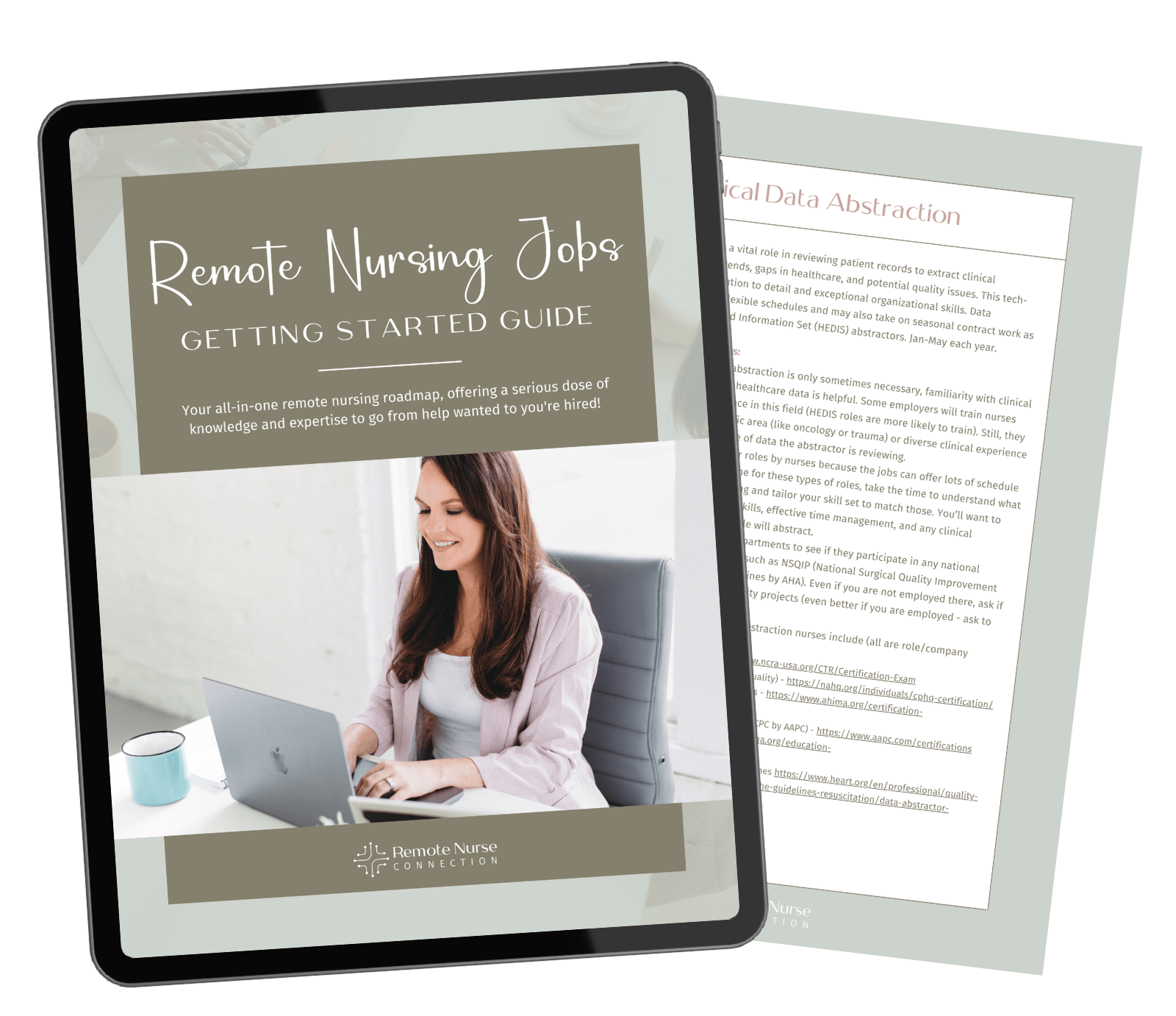
Have you heard the buzz about HEDIS nursing? Interested to know what it entails or if it’s the right career path for you? Well, you’ve come to the right place!
One essential tool to enhance and monitor patient quality is HEDIS, short for the Healthcare Effectiveness Data and Information Set. It’s a quality performance measurement tool used by insurance companies to measure healthcare quality. Each year, the National Committee for Quality Assurance (NCQA) sets new standards, making HEDIS a cornerstone of quality assessment in healthcare.
But What Exactly is HEDIS?
HEDIS, or the Healthcare Effectiveness Data and Information Set, is a standardized quality performance measurement tool. It covers many healthcare aspects, from preventive care to disease management. What makes HEDIS truly significant is its widespread use. NCQA states, “More than 200 million people are enrolled in health plans that report HEDIS results.” It’s one of the most widely used tools for improving healthcare performance in the US.
Clinical Data Abstraction: What’s That About? Why Nurses Are the Go-To for Data Abstraction
Now, let’s dig deeper into clinical data abstraction, the engine behind HEDIS. It’s about capturing essential clinical data from medical records. These records are like treasure chests of vital information needed to assess healthcare quality.
In the HEDIS world, nurses play a crucial role in data abstraction. They meticulously review and audit medical records from participating health plans.
What’s their mission exactly? To extract specific data points required to assess healthcare quality according to the NCQA’s measures. Nurses with varied clinical backgrounds, attention to detail, and tech-savvy skills perfectly fit this task.
Data abstraction companies have an excellent reason to seek out nurses for data abstraction. Their clinical knowledge gives them a deep understanding of medical records and terminology. Nurses are highly skilled at spotting relevant information within a medical record. Nurses also have the expertise to interpret NCQA’s technical specifications and pinpoint the correct data within medical records.
The Perks of Short-Term Data Abstraction Contracts
Let’s discuss why short-term HEDIS nursing data abstraction contracts are all the rage. Some companies offer these gigs as temporary or seasonal positions. What’s the big draw? The flexibility they offer with little to no phone time. These roles often have highly adaptable hours, allowing nurses to tailor their schedules.
The short-term contracts are a hit because they offer the potential for extra income, all from the comfort of home. Nurses can dive into data abstraction contracts as a side gig. They can fit them in between travel nursing contracts or other nursing jobs. While year-round HEDIS nursing jobs are available, short-term contracts are popular because of the extra cash and flexibility they promise.
Remote Nursing Jobs
Remote nursing jobs have increased, and 2020 accelerated the trend. Working remotely as a nurse sounds pretty dreamy, right? It can offer flexibility and a better work-life balance with no commute time. But here’s the deal: competition is fierce. Thousands of nurses are eyeing these remote positions. And even more are eyeing the ones with flexible scheduling options.
Finding Flexible Remote Work in Data Abstraction
So, how can you snag one of these flexible remote data abstraction contracts? First, these roles start posting in the fall, around September to early October. The onboarding typically kicks off after the holidays, in January or February, and contracts usually last until April or May.
You can find these opportunities on popular job boards like Indeed or LinkedIn. But be cautious; where there’s high demand, there can be scams. Scammers might pose as companies or recruiters on job boards, so vet these opportunities carefully. One of the benefits of searching for jobs on Remote Nurse Connection’s free job board is that every job is reviewed and vetted before sharing it!
Nursing at Home as a Side Gig
One of the perks of data abstraction contracts is the flexibility they offer. Many companies with these contracts have flexible work policies for the season. They often offer part-time and full-time hours. Part-time positions are super competitive, though, due to their popularity.
Nurses can seamlessly add data abstraction work to their schedules, even alongside their three 12-hour weekly shifts. Committing to a minimum of 15-20 hours per week opens up opportunities for earning extra income without disrupting your primary nursing role. But if you’ve been struggling to land one of the part-time side gigs, consider finding a way to accept one of the full-time roles for the season. Why, you ask? Because the number of full-time, seasonal contract applicants is less than the part-time roles, and they start posting earlier, giving you more time to apply to more HEDIS remote nursing jobs.
Skills Needed for HEDIS Nursing Data Abstraction
To excel in data abstraction, you’ll need a mix of transferable job skills and qualifications, including:
- Nursing clinical knowledge and background
- Attention to detail
- Tech-savviness
- Organizational skills
- Strong time management abilities
- The knack for independent work, delivering quality within specified metrics
Pro Tips for Landing Short-Term Contracts
Nailing down short-term data abstraction contracts involves networking. LinkedIn is a great platform to connect with recruiters and discover these roles. Use keywords like “HEDIS nurse,” “HEDIS nursing,” “clinical abstractor,” “clinical data abstraction,” and “nurse abstractor” to find relevant job listings. I have a free guide available to download showing you how to optimize your LinkedIn profile for remote nursing jobs. Using ATS resume scanners, like SkillSyncer & Jobscan, before submitting your resume will also boost your chances of landing an interview for these remote roles.
Remote Work Best Practices
For nurses who have landed a role in HEDIS data abstraction, especially as a side gig, here are some tips for success:
- Plan Your Schedule: Set your work hours in advance to meet your weekly commitment.
- Create a Distraction-Free Workspace: Designate a quiet area to boost productivity. Data abstraction is very attractive to nurses who have opted to be at home with family/children. These jobs can offer a lot of schedule flexibility, but that depends on employer preferences. Suppose you’ve never worked in a data abstraction role, or this is your first remote gig. In that case, getting familiar with the tech setup, software abstraction tools, and the technical specifications used for abstracting can take some time. Giving yourself a distraction-free workplace while learning something new will make it easier for you as the season progresses.
- Ask Questions During Training: Seek clarity on NCQA HEDIS technical specifications to ace data abstraction.
- Pay attention during training! If you value returning every season as a HEDIS abstractor, you’ll want to pay attention during training to ensure you will maintain quality abstraction metrics.
Compensation and Earning Potential
Earnings in data abstraction can vary widely based on your experience and location. Generally, nurses can expect to earn between $25 to $40 per hour in their first season. Your ability to negotiate and your prior qualifications & skills play a role in determining your compensation. Be sure to ask the employment contract details during the recruiter screening process – contract employee, 1099 contract, W2? You’ll want to know all the facts to decide when to accept the job.
Challenges and Considerations
While data abstraction offers abundant opportunities, be aware of potential challenges:
- Scams: Be cautious of scams in the remote nursing job market. Some may pose as recruiters, trying to gather your personal information. Always vet job opportunities carefully.
- Tailoring Resumes: Applying for multiple contracts can be time-consuming. Consider having a draft resume optimized for data abstraction roles, making it easier to tailor to specific job descriptions.

Personal Success Story
Finally, I thought I’d briefly share how I achieved my goal of landing a HEDIS job in 2022.
As my maternity leave ended, I knew I wanted to continue to be at home with my daughter, but I also wanted to keep working. While researching remote nursing roles that offered schedule flexibility, I stumbled upon clinical data abstraction roles. After a couple more weeks of research, I decided to focus on getting hired for a seasonal HEDIS abstraction role. We worked out in-home childcare options and got that all squared away, hoping I’d land the job I wanted.
I fine-tuned the application strategy I used to land my first remote nursing job a few years prior and got everything organized and ready to start applying for these jobs in the fall. I set up job alerts and submitted my applications as soon as I saw a job post I wanted. I wrote down my goals and must-haves and made sure I only focused my energy on jobs that aligned with exactly what I was looking for.
Good things started happening…
In just two weeks, I started getting callbacks and setting up interviews. I got some fantastic and not-so-great offers (one company offered me $23/hour – 🥴). After a few interviews, I knew one would be a perfect fit, and they offered me the job. I read so many things online about how getting hired for these roles without experience was impossible because they are so competitive. And you know what…
I knew that I had the transferable job skills they were seeking, and I clearly emphasized those skills on my resume and cover letter. In the interview, I let them see how coachable I was and eager to learn what they were willing to teach me. But if I can achieve my goal, I hope to help you do the same and give you the courage and motivation to take that first step!
This is why I put all the information I wished I had while going through this process into my online course, How to Get Hired for HEDIS: Strategies for Nurses (2.9 nursing contact hours). I scoured the internet looking for a course I could take to show me how to land these jobs – and found nothing reputable. No certification courses are available to teach nurses how to abstract for HEDIS; it’s all on-the-job training but what I was really looking for was information on how to leverage my current nursing skills on my resume to land one of these roles.
So, if you’re ready to see what HEDIS is all about and find out 5 simple strategies to get hired, download this free guide I put together for you! The free guide and introductory HEDIS course are also available in the free membership.
How are you taking steps to reach your career goals???
Remote Nurse Connection is proudly Ad-free. All opinions are my own. This post may contain affiliate links, which means I’ll receive a commission if you purchase through my link, at no extra cost to you. As an Amazon Associate, I earn from qualifying purchases. Please read full disclosure here.
Browse A Bit More On the Blog…
3 Resume Mistakes Nurses Make When Applying to Utilization Review Jobs (And How to Avoid Them)
Jun 20, 2025
Writing a strong utilization review nurse resume isn’t just about ATS formatting; it’s about knowing what to say, what to leave out, and how to shift the focus from bedside tasks to clinical thinking. And for most nurses making this transition, that’s where things get...
Want a Less Stressful Nursing Job? Here’s How to Become a Nurse Data Abstractor
Jun 17, 2025
If you’ve been searching for a less stressful, flexible remote nursing job that lets you work from home and still use your clinical knowledge, you’ve probably come across roles like “nurse data abstractor.” But trying to figure out what the job actually involves or,...

Your Insider Connection to Remote Nursing Success
I help nurses find the best-fit remote jobs that bring flexibility, personal freedom and alignment, and continued professional growth.
CATEGORIES

Free Getting Started Guide
FOR LANDING A
REMOTE NURSING POSITION!



